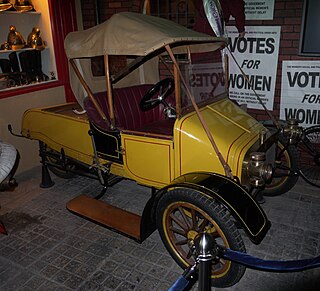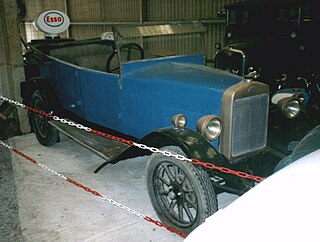
The Morgan Motor Company is a British motor car manufacturer that was founded in 1910 by Henry Frederick Stanley Morgan.

Berkeley Cars Ltd of Biggleswade, Bedfordshire, England produced economical sporting microcars with motorcycle-derived engines from 322 cc to 692 cc and front wheel drive between 1956 and 1960.
Coventry Victor was a British motorcycle and car manufacturer. Originally Morton & Weaver, a proprietary engine manufacturer in Hillfields, Coventry, founded in 1904, the company changed its name to Coventry Victor Motors in 1911, the company closed in 1971.
The Ashton-Evans was an English car manufactured in Birmingham from 1919 to 1928 by Joseph Evans & Co of Liverpool Street Mills an engineering company who also made railway locomotives and aircraft parts. In 1919 a new company Ashton-Evans Motors Ltd was formed. The cars were designed by E Bailey who had been with Sunbeam and later J. Bedford.
The Lanchester Motor Company Limited was a car manufacturer located until early 1931 at Armourer Mills, Montgomery Street, Sparkbrook, Birmingham, and afterwards at Sandy Lane, Coventry England. The marque has been unused since the last Lanchester was produced in 1955. The Lanchester Motor Company Limited is still registered as an active company and accounts are filed each year, although as of 2014 it is marked as "non-trading".

The Austin 7 is an economy car that was produced from 1922 until 1939 in the United Kingdom by Austin. It was nicknamed the "Baby Austin" and was at that time one of the most popular cars produced for the British market and sold well abroad. Its effect on the British market was similar to that of the Model T Ford in the US, replacing most other British economy cars and cyclecars of the early 1920s. It was also licensed and copied by companies all over the world. The very first BMW car, the BMW Dixi, was a licensed Austin 7, as were the original American Austins. In France they were made and sold as Rosengarts. In Japan, Nissan also used the 7 design as the basis for their first cars, although not under licence. This eventually led to a 1952 agreement for Nissan to build and sell Austins in Japan under the Austin name.

Albion Motors was a Scottish automobile and commercial vehicle manufacturer.

Crouch Cars was a company founded by JWF Crouch in Coventry, England in 1912 which manufactured cars until 1928. It was located at first in Bishop Street moving in 1914 to Cook Street.

The Swift Motor Company made Swift Cars in Coventry, England from 1900 until 1931. It grew progressively from James Starley's Coventry Sewing Machine Company, via bicycle and motorised cycle manufacture. The cars ranged from a single-cylinder car in 1900 using an MMC engine, through a Swift-engined twin-cylinder 7-horsepower light car in 1904, and a 3-litre model in 1913. After the First World War a successful range was sold during the 1920s, but the Cadet of 1930 was its last vehicle as it could not compete economically with volume manufacturers such as Ford and Morris Motors.

Fairthorpe cars were made in Chalfont St Peter, Buckinghamshire, England between 1954 and 1961, from 1961 to 1973 in Denham, Buckinghamshire.
Ginetta Cars is a British specialist builder of racing and sports cars based in Garforth, Leeds, West Yorkshire.

Turner Sports Car Company Limited was a 1950s British sports car manufacturer, that closed in 1966.

The Morgan Plus 4 is an automobile produced by the Morgan Motor Company from 1950 to 1969. It is a more powerful and, in the case of the earlier cars, slightly longer version of the company's previous 4/4 model. Plus 4 production was revived in 1985 and filled the gap between the 4/4 and the Plus 8 until 2000; it was again revived in 2005.

The TVR Grantura is the first model in a long line of TVR cars and debuted in 1958. The cars went through a series of developments leading to the I to IV and 1800S models. The last ones were made in 1967.

Coventry Premier Limited owned a British car and cyclecar manufacturing business based in Coventry from 1912 to 1923. It changed its name from Premier Cycles to Coventry Premier Ltd in November 1914.

The Ford Thames 400E is a commercial vehicle that was made by Ford UK and introduced in 1957. Production of the range continued until September 1965, by which time a total of 187,000 had been built.
The Palmerston was a British car made by the Palmerston Motor Company based in Bournemouth, England between 1920 and 1923.

The Warren-Lambert Engineering Co. Ltd. was a British automobile manufacturer that was established from 1912 to 1922 in Richmond, then in Surrey. A. Warren Lambert, was an agent for Morgan cars in Putney which he also raced. In 1912 he designed and started to manufacture a two-seat four-wheel cyclecar from premises in Uxbridge Road, Shepherd's Bush. It was well received and around 25 cars a week were being made.

Gordon, Gordon Armstrong, was a British cyclecar produced in Beverley Yorkshire by 'East-Riding Engineering' from 1912–1916. Production was halted by World War I.

The Rhode was a British car made from 1921 to 1930. Mead and Deakin Ltd had started in business making cycle and motor cycle components. They also made the "Canoelet" sidecar. In 1912 they made at least two cyclecars under the name of Medea with 1244cc Chapuis-Dornier emgines but these did not go into series production.


















